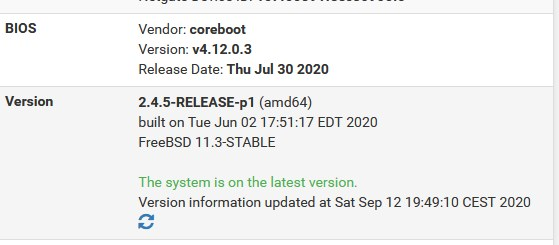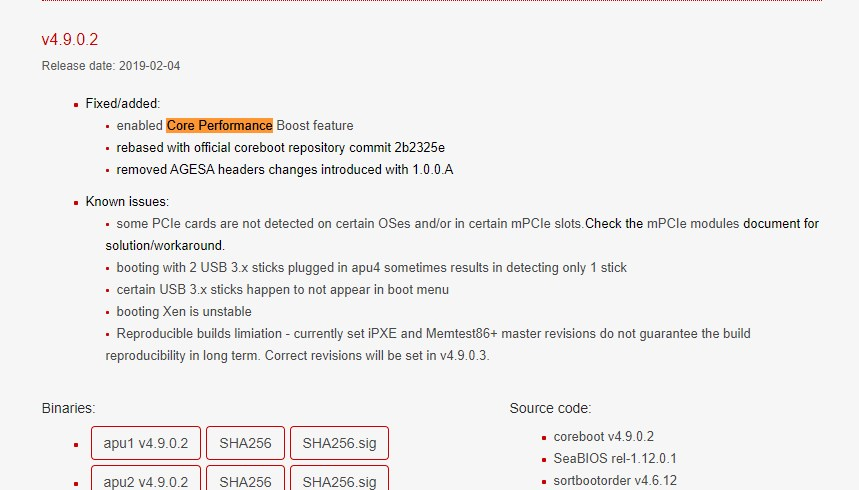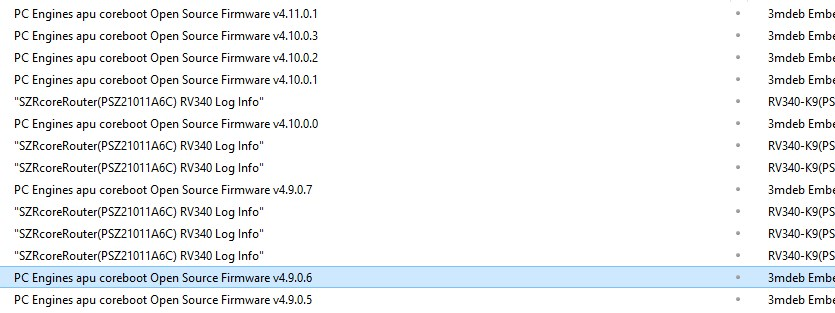"Page fault while in kernel mode" on APU2 after bios/coreboot upgrade
-
@CS said in "Page fault while in kernel mode" on APU2 after bios/coreboot upgrade:
possibly downgrade to an older version of coreboot.
Hi,
Unnecessary step back (downgrade) APU2 based boxes work perfectly with the new BIOS

The problem is maybe that, with a "legacy BIOS" version left for a long time (I don't understand why?) and now you've taken a big step forward onto an old pfSense install
My suggestion is a full backup followed by a fresh pfSense installation with the latest BIOS
 (v4.12.0.4)
(v4.12.0.4)Important:
After installing the BIOS, the APU boards require a complete power outage (60- 120 sec), a hot and cold reboot is not enough !!! -
Uptime: 16 hours with no crash yet, fingers-crossed. :)
Thanks @DaddyGo , I had done the complete power outage so that shouldn't be an issue here.
I agree that a fresh pfSense with the latest BIOS would be ideal but I keep this as my last option right now. Ideally I wouldn't even restore my config and do everything from scratch but I'm not sure if I'll have the time and patience to do that.
In regards to your comment about the legacy BIOS version, honestly I didn't have a good reason to keep upgrading the BIOS when the device works flawlessly with the latest pfSense releases. Sometimes the BIOS upgrades might cause issues and I didn't have time to deal with these. I upgraded now because the device relocated and it's always a good opportunity to start fresh with the latest versions.
-
@DaddyGo said in "Page fault while in kernel mode" on APU2 after bios/coreboot upgrade:
Unnecessary step back (downgrade) APU2 based boxes work perfectly with the new BIOS
@DaddyGo can you please confirm if "Core Performance Boost" is currently enabled or disabled in your BIOS? For the record, I have Coreboot v4.12.0.4, not v4.12.0.3. Let me know how it goes when you upgrade.
-
@CS said in "Page fault while in kernel mode" on APU2 after bios/coreboot upgrade:
can you please confirm if "Core Performance Boost" is currently enabled or disabled in your BIOS?
We have been using APU boards for many years, so we have a lot of experience with these MOBOs.
We’ve been through a lot of BIOS versions already.
We have long deviated from the legacy BIOS line at the suggestion of pcEngines and 3mdeb.
CPB has been in use for a long time, as the first CPU core spins at 1,400 at this time, which is good for OpenVPN stuff.
CPB has been enabled since V4.9.0.2

with this you can check: sysctl dev.cpu.0.freq_levels
Updating the BIOS is quite difficult due to known USB flash drive problems, almost only the Kingston DT100 G3 can update the BIOS. I also quickly bought 16 and 32G models out of it as they are no longer available.
The sequence of operations is well described here, if you need help I am happy to be at your disposal.
https://pcengines.ch/howto.htm#TinyCoreLinuxregister for BIOS information here:
https://pcengines.github.io/
(you will receive a first-hand update via email)
btw:
Also, don’t forget about Intel tweaks and the correct configuration of your NIC
loader.conf.local....
like:legal.intel_ipw.license_ack=1
legal.intel_iwi.license_ack=1
hw.igb.rx_process_limit=-1
hw.igb.tx_process_limit=-1
hw.igb.rxd=1024
hw.igb.txd=1024
hw.igb.max_interrupt_rate=64000and etc......
system tunables...
disable EEE,
disable flow control
kern.ipc.nmbclusters
set net.inet.ip.redirect (enable tryforward routing path ipv4)and similar things....
-
@DaddyGo thanks a lot for your response.
For the record, the device has been working smoothly without any crashes for about 6 days after I disabled CPB. So that was definitely what caused the issue. I'll try to re-enable it and do some tuning in case this can be solved without having to keep CPB disabled or re-install pfSense from scratch. I'll provide updates about my progress on this thread for future reference.
-
@CS said in "Page fault while in kernel mode" on APU2 after bios/coreboot upgrade:
the device has been working smoothly without any crashes for about 6 days after I disabled CPB
This means that your problem is CPB dependent, but I really have not heard of anyone else having this problem in the long run.
CPB is not a required feature, but if it already exists and can be enabled, why not use it.
For us, it caused a significant improvement in ExpVPN connectionsThese links can also be useful:
https://teklager.se/en/knowledge-base/apu2-vpn-performance/
https://teklager.se/en/knowledge-base/apu2-1-gigabit-throughput-pfsense/
https://teklager.se/en/knowledge-base/btw:
99% of pcEngines users use CPB, the forum is full of APU board descriptions, I think it's a good thing -
@DaddyGo said in "Page fault while in kernel mode" on APU2 after bios/coreboot upgrade:
btw:
99% of pcEngines users use CPB, the forum is full of APU board descriptions, I think it's a good thingI have CPB too, and I have tested with and without, there was no difference in the pfsense behavior (beside speed increase), but I think that the original posters APU has RAM that is on the "limit" and the increasing of speed make that RAM to produce errors.
Thats what I suppose.Fine Weekend,
fireodo -
@fireodo said in "Page fault while in kernel mode" on APU2 after bios/coreboot upgrade:
but I think that the original posters APU has RAM that is on the "limit" and the increasing of speed make that RAM to produce errors.
This is very possible....exhausted RAM
no matter how good the APU stuff is, 4GB of RAM was often on the "verge" for me
Don't forget @fireodo that 3mdeb (BIOS developers) has been activating RAM ECC for some time
so this should help with RAM errors
-
@DaddyGo said in "Page fault while in kernel mode" on APU2 after bios/coreboot upgrade:
Don't forget @fireodo that 3mdeb (BIOS developers) has been activating RAM ECC for some time
so this should help with RAM errors
I know - but if the Hardware is not OK (the RAM-Chips) then even ECC cannot compensate that!
-
@fireodo said in "Page fault while in kernel mode" on APU2 after bios/coreboot upgrade:
Hardware is not OK
That’s really true, and then we’ll see what the OP gets
-
@DaddyGo, @fireodo , @stephenw10
Hey folks, let me provide an update here:
- Memtest was completed without errors but pfSense kept crashing.
- I upgraded coreboot to v4.12.0.5 but it kept crashing.
- I reinstalled pfSense 2.4.5-RELEASE-p1 and restored my config but it kept crashing, which is something I was not expecting.
- I kept the CPU Boost config option in my loader.conf.local and disabled again the option "Core Performance Boost" in Bios. It stopped crashing and CPU Boost is still active:
dev.cpu.0.temperature: 62.7C dev.cpu.0.cx_method: C1/hlt C2/io dev.cpu.0.cx_usage_counters: 24303377 0 dev.cpu.0.cx_usage: 100.00% 0.00% last 1981us dev.cpu.0.cx_lowest: C1 dev.cpu.0.cx_supported: C1/1/0 C2/2/400 dev.cpu.0.freq_levels: 1400/-1 1200/-1 1000/-1 dev.cpu.0.freq: 1400 dev.cpu.0.%parent: acpi0 dev.cpu.0.%pnpinfo: _HID=none _UID=0 dev.cpu.0.%location: handle=\_PR_.P000 dev.cpu.0.%driver: cpu dev.cpu.0.%desc: ACPI CPUCore Performance Boost is triggering this for some reason, it was crashing randomly and not when it was under load.
Could anyone share their APU2 loader.config.local file for reference? I'm wondering if I'm missing something obvious, I haven't done any tuning for years because it has been running smoothly with no issues. -
The fact it threw an MCA error implies it was hitting some hardware issue and it looked to be in the RAM.
I'm not entirely sire what the Core Performance Boost setting does but I could well believe it pushes the RAM or bus speed up with the CPU. Your RAM appears to be incapable of running stable at that new rate. Or something lsimilar to that.
Steve
-
are you sure it's ram?
to me it can be overclocked cpu or burned cpu
MCA: Vendor "AuthenticAMD", ID 0x730f01, APIC ID 1 MCA: CPU 1 COR ICACHE L1 IRD errorMachine Check Architecture
CPU 1
COR = Corrected
ICACHE = Instruction Cache
L1 = L1 Cache (On Chip)
IRD = Instruction Fetch
error is self explanatory. -
Nope I'm not sure. And your explanation looks better!
Pretty much the only thinh that made me think it might be ram was:
MCA: Bank 1, Status 0x9400000000000151Which I assume to be a RAM bank but it could be cache or some other terminology.
Steve
-
@kiokoman thanks, that's a good point. I have seen crashes with CPU ID 0 and CPU ID 1.
Last three dumps:
Fatal trap 12: page fault while in kernel mode cpuid = 0; apic id = 00 fault virtual address = 0x1af fault code = supervisor read instruction, page not present instruction pointer = 0x20:0x1af stack pointer = 0x28:0xfffffe0118ce1890 frame pointer = 0x28:0xfffffe0118ce18f0 code segment = base 0x0, limit 0xfffff, type 0x1b = DPL 0, pres 1, long 1, def32 0, gran 1 processor eflags = resume, IOPL = 0 current process = 11 (idle: cpu0) trap number = 12 panic: page fault cpuid = 0 KDB: enter: panicspin lock 0xffffffff83517de8 (smp rendezvous) held by 0xfffff8009ddbf000 (tid 100206) too long timeout stopping cpus panic: spin lock held too long cpuid = 1 KDB: enter: panicspin lock 0xffffffff83517de8 (smp rendezvous) held by 0xfffff8008b216620 (tid 100197) too long timeout stopping cpus panic: spin lock held too long cpuid = 1 KDB: enter: panic -
it can be useful for others with this kind of errors but
it's the MCI status register, not the RAM bank
ECC error (ADDR valid) 0x9426c0010b000813 ECC error overflow (ADDR valid) 0xd426c0010b000813 ECC error (ADDR invalid) 0x9026c0010b000813 ECC error overflow (ADDR invalid) 0xd026c0010b000813 L1 Cache Data Store error (UE) 0xb600200000000145 **L1 Instruction Cache (Instruction Fetch) error (ADDR valid) 0x9400000000000151** L1 Instruction Cache (Instruction Fetch) error overflow (ADDR valid) 0xd400000000000151 Bus Unit (L2 Cache) error (UE) 0xb600000000020136 L2 Data Cache (Line Fill) error (ADDR valid) 0x9400400000000136 L2 Data Cache (Line Fill) error overflow (ADDR valid) 0xd400400000000136this is specific for this CPU:
The error-reporting machine check register banks supported in this processor are: • MC0: Data cache (DC). • MC1: Instruction cache (IC). <- "MCA bank 1" • MC2: Bus unit (BU), including L2 cache. • MC3: Reserved. • MC4: Northbridge (NB), including the IO link. These MSRs are also accessible from configuration space. There is only one NB error-reporting bank, independent of the number of cores. • MC5: Fixed-issue reorder buffer (FR) machine check registers. -
@CS
CPU ID 0 and CPU ID 1 it's probably a dual core cpu ?
timeout stopping CPUs, it was unable to speak with the CPU
with spin lock held too long, it's basically telling you: "I can't wait forever here, so I guess I'll stop and panic"
based on what you had before I would check CPU settings like overclock / voltage / frequency, overheat, and dust on the fan if there is oneDoes it seem to be a common problem for Apu2 ? https://forum.netgate.com/topic/156830/could-you-help-me-analyze-these-crashdumps?_=1602587866619
-
@kiokoman APU2 has a single AMD Embedded G series GX-412TC, 4 CPUs: 1 package x 4 cores.
No overclocking and no active cooling in place for these boards.Reference: https://pcengines.ch/apu2.htm
-
ah i didn't understand that the problem was solved
so it was Core Performance Boost
it was probably overclocking the cpu -
@kiokoman correct, "Core Performance Boost" was causing it and we were trying to find out why considering that other folks have it enabled on APU2 without experiencing any issues.